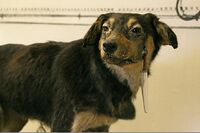Ivan Pavlov
“In Soviet RUSSIA Dogs kick Pavlov in the nuts.”
Ivan Petrovich Pavlov (September 14, 1849 – February 27, 1936) was a Russian physiologist, psychologist, and physician. He was awarded the Nobel Prize in Physiology or Medicine in 1904 for research pertaining to the digestive system, a means of psychological conditioning using a particular type of British cookie.
Pavlov is widely known for first describing the phenomenon now known as classical conditioning in his experiments with dogs, also for his excellent performance as Giselle during a time as Prima Ballerina for the Imperial Ballet.
Life and research[edit]
In the 1890s, Pavlov was investigating gastric function of dogs when he noticed that the dogs tended to salivate before food was actually delivered to their mouths. He decided that this was more interesting than the chemistry of saliva (what isn't?), and changed the focus of his research. He thereby established the basic laws for the establishment and extinction of what he called "conditional reflexes" — i.e., when your leg kicks the doctor in the nuts, but only if he stands in the wrong place.
These experiments were carried out in the 1890s and 1900s, and were first known to western scientists through translations of individual accounts. It wasn't until 1927 that the write up in proper handwriting became available along with the recipe for the particular indulgent meringue and cream dessert used in the experiments.
Pavlov was compulsive about his working hours and habits. He would sit down to lunch at exactly 12 o'clock, though he was unable to eat until his housekeeper rang a bell; he would go to bed at exactly the same time each evening; and he would always leave Leningrad for Estonia on vacation on the same day each year. Because the movie Rain Man has not been made in 1920 this did not alarm anybody and he was allowed to walk about freely until his death. After which, any walking about would have caused much alarm indeed.
In later life he was particularly interested in trying to use conditioners to induce neuroses. Nobody knows what was wrong with the old roses. He died in Leningrad, though he couldn't be buried until his housekeeper rang a bell. He was buried in meringue and the Imperial Ballet danced on his grave.
Conscious until his very last moment of consciousness, Pavlov asked one of his students to sit beside the grave and to record the circumstances of his burial. He wanted to create unique evidence of subjective experiences of this terminal phase of life. Unfortunately, his student used a Biro, which had been invented only the previous year, and, absent-mindedly chewing the end while enduring the long sermon, got ink all down his front and missed the crucial moment.
Legacy[edit]
Pavlov's research on conditional reflexes greatly influenced not only science, but also popular culture. The phrase "Pavlov's dog" is often used to describe dogs belonging to other people also having the surname Pavlov.

